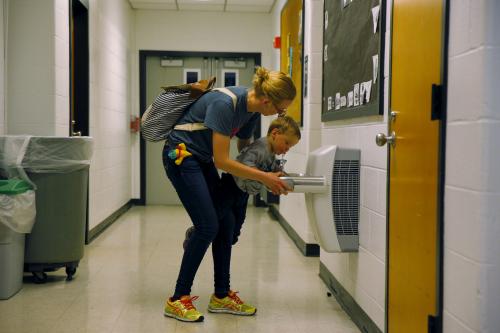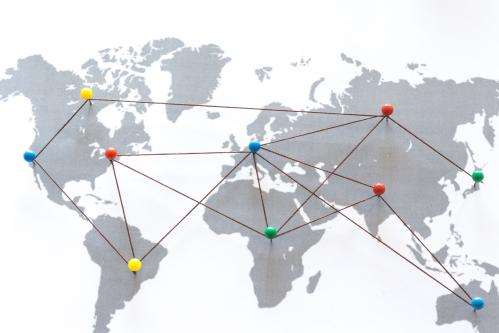In a recent New York Times interview, Elon Musk was asked how he balances his “insane” work schedule—colonizing Mars, mainstreaming electric vehicles, etc.—with caring for his new baby. His response? He doesn’t. “Well, babies are just eating and pooping machines, you know?” he said. “Right now there’s not much I can do.”
I was shocked to read that Musk holds such antiquated views about child development, and a father’s role in it. Because in reality, there is so much that Musk—and all dads—can do. This is especially true in the time of COVID-19.
Like all parental figures, fathers have an incredibly important role to play in building their children’s brains. Remarkably, all it really takes is nurturing talk and responsive interaction. These interactions are particularly influential during the first three years of life, when brain growth is most rapid. During this time, billions of neural connections are created, building the complex circuitry that becomes a child’s foundation for learning. And thanks to recent advances in neuroscience, we know that the back-and-forth of conversation increases brain activation and ultimately contributes to stronger skill formation.
So it’s no surprise that the literature, which includes both correlational and causal studies, has demonstrated that when dads actively engage with their babies and toddlers, they positively impact their children across a wide range of outcomes—including cognitive, language, and executive function skills. For example, one 2006 study found that three-year-olds scored higher on cognitive exams when their fathers engaged positively with them during playtime—by responding to their children’s signals and building on skills the child already showed—than toddlers whose fathers were excessively negative or controlling while playing. Other research has shown that toddlers whose fathers read to them as infants scored higher on language assessments.
Some studies of heterosexual couples have even found that certain actions, when done by dads, have an even greater impact on a child’s development than if that action had been done by a mom. One 2014 study showed that some toddlers whose fathers often read to them had better receptive vocabulary and cognitive skills one year later. In contrast, mothers’ frequent reading did not seem to have a connection with a toddler’s improved vocabulary skills (though it was a predictor of later cognitive skills). This study doesn’t imply that all households need to have dads in order for toddlers to improve their vocabulary—or for any reason—nor does it imply mothers don’t play critical roles in child language development. Rather, it says that in families with fathers, dads have a unique ability to impact their young children’s growing language abilities.
Recently, I was lucky enough to meet a group of fathers who are learning and embracing the science of early brain development. I joined a handful of Arizona fathers on Zoom for their graduation from Let’s Talk Dads, a program that teaches them the science of their children’s early brain development and the critical role they can play in that development. It also teaches easy-to-use strategies for building more talk and interaction into everyday interactions with their children. (My organization, the TMW Center for Early Learning + Public Health, created Let’s Talk Dads with philanthropic support from the Steve Nash Foundation. It is implemented by Southwest Human Development.)
One by one, the dads shared their biggest takeaway from the program. One participant, Ahbi, reflected on his realization that he wasn’t fully present when spending time with his son. “I was probably lacking” when it came to interactive engagement, he said. “I was on the phone sometimes when [my son] was talking to me.” After learning how active engagement with his son now can influence so much of his life later, Ahbi tuned in more.
As I listened to the Let’s Talk Dads graduation, I saw how fathers’ increased appreciation for their role in building their children’s brains seemed to result in them becoming more aware of the importance of sharing child-care responsibilities with their partners more equally. “My wife was doing a lot of things,” Ahbi admitted of their life prior to his enrollment in the program.
I was especially glad to hear this because in the age of COVID-19, the demands placed on families are more burdensome than ever before—and women are shouldering a disproportionate share of that burden. According to one study, “mothers with young children have reduced their work hours four to five times more than fathers.” And in response to a New York Times survey, 80% of moms said they spent more time than their spouse home schooling or helping their children with distance learning.
Before the pandemic, however, a survey found that over 80% of fathers wished they could spend more time with their young children. Now, many fathers are working from home while others, tragically, are out of work. Millions of children are home at the same time. Though the present circumstances—terrible stress, economic hardship, uncertainty, and illness inflicted by a global pandemic—surely are not what those survey respondents had in mind, the reality is that many children are now exposed to more time with their dads. That’s why I want to remind all dads that there is so much that each one of you can do to aid in your kids’ development. You can build your children’s brains with every word you speak to them and every warm interaction you share. The first three years are incredibly important for life-long learning and development, a window of opportunity you can seize to ensure that your children are given a chance to realize their fundamental promise.
Of course, the importance of nurturing interactions with a caring adult is not limited to times of crisis. Fathers, like all caregivers, possess this incredible power in more “ordinary” times as well. But far too often, they are not given the opportunity to yield it. Our current crisis has made it painfully clear that our society fundamentally undervalues child care, no matter who provides it. So, if we want more dads to share more childcare responsibilities, we need to champion workplace policies and public policies that help them do so. After all, “Many fathers fear workplace stigma if they prioritize (or even balance) childcare responsibilities with professional responsibilities,” according to a 2020 survey. And yet, if I’ve learned anything from Let’s Talk Dads, it’s that when given the necessary information and support, fathers will eagerly embrace their role as one of the primary architects of their child’s brain.
So, in this time of great uncertainty, it is my hope that we can help families make the most of their new reality by sharing the science of paternal engagement, empowering more fathers to embrace their capacity to impact their children’s cognitive and socio-emotional development, and to share in the work of building healthy young brains.
The Brookings Institution is committed to quality, independence, and impact.
We are supported by a diverse array of funders. In line with our values and policies, each Brookings publication represents the sole views of its author(s).







